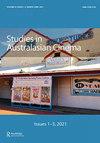Mad Max and the Western
IF 0.7
0 FILM, RADIO, TELEVISION
引用次数: 0
Abstract
ABSTRACT The Mad Max films were among the most successful exports of the Australian New Wave and had an enormous impact on shaping what the cinematic post-apocalyptic landscape looks like around the world. In line with Tom O'Regan's argument about Australian cinema's dialogue with Hollywood cinema, I argue that a productive way of looking at how the films create meaning is in the way they position themselves in relation to a genre that looks back in time rather than into future: the Western. Using as analytical frame the works of two key theorists of the Western, Will Wright and Richard Slotkin, I want to show that the films individually and collectively invert certain structural elements and developments of the genre. The first film subverts ideas of regenerative violence, questioning the justification and social value of self-defense and vigilantism. The second film echoes classical Western tropes regarding mobility and sedentary life, individual and community, savagery and civilization, garden and desert, which the third film further explores. In this way the films contribute to a dialogical identity of Australian cinematic identity in relation to the dominant Hollywood cinema as a critical interrogation of its national(ist) mythologies.疯狂的麦克斯和西部片
本文章由计算机程序翻译,如有差异,请以英文原文为准。
求助全文
约1分钟内获得全文
求助全文

 求助内容:
求助内容: 应助结果提醒方式:
应助结果提醒方式:


